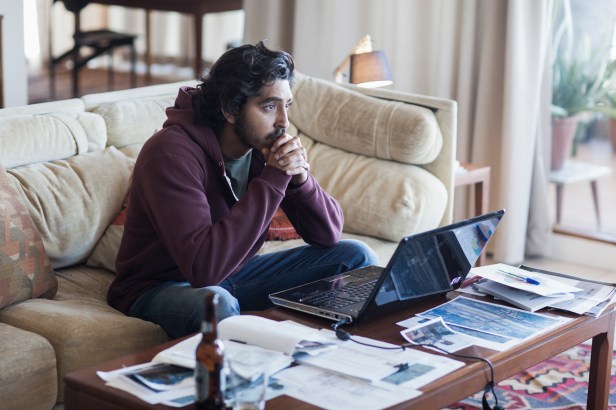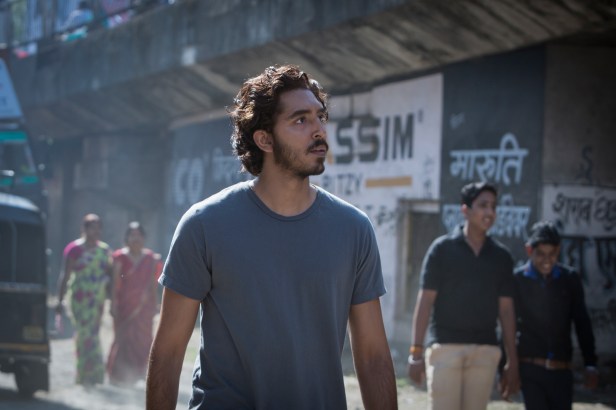Lion (2016)
The true story of a lost and found
It’s 1986 in rural India and Saroo (Sunny Pawar) is a happy-go-lucky 5-year-old boy whose best friend is his street-smart older brother Guddu (Abhishek Bharate). Saroo’s struggling mother, Kamla (Priyanka Bose), spends her days looking after Saroo’s young sister Shekila (Khushi Solanki) and works after the sun goes down lifting rocks at a quarry. It’s on one of these nights that Saroo ventures out to a train station with his big bro (who leaves town to lift bales for a week), Guddu insisting that Saroo wait for him at the station while he sorts a few things out … trouble is, he doesn’t come back.

In an attempt to find his missing brother, Saroo gets very lost, ending up in Calcutta, the language difference further alienating the young boy who can only speak in his native Hindi while the locals commonly use Bengali to communicate. Through a series of unfruitful attempts to locate his home, Saroo eventually becomes an orphan and is subsequently adopted by an Australian couple — Sue and John Brierley (Nicole Kidman and David Wenham, respectively) — who live in Hobart, Tasmania.
Twenty years later, Saroo (now played by Dev Patel) encounters fellow student Lucy (Rooney Mara) while studying a hotel management course in Melbourne, becoming romantically involved with her. During a dinner with some friends, Saroo reveals his painful past when it’s suggested to him that he try to use the (then) new program Google Earth to calculate and perhaps even retrace his way back to his childhood home and find his long lost biological family.
I’m just going to put it out there — this is an amazing true story. I’ve always been fascinated by narratives that illustrate the highs and lows of our recent history, especially in terms of technology and Lion really says a lot, not so much about advanced tech, but identity, memory and the power of both of persistence and reconciliation.

As the first act went on, I must confess, I soon became worried — not necessarily about the fate of the young Saroo, but of the narrative progression itself. Rendered in a terribly slow and underwhelming linear structure by writer Luke Davies, Candy (2006), I felt as though I was experiencing the most uncomfortable aspects of Slumdog Millionaire (2008) play out in slow-motion. While I respect that Lion is based on true events, these prolonged scenes of unjust treatment towards children just feel overly manipulative. On and on it goes, perhaps to really hammer home the boy’s hopelessness and desperation. I’d imagine that the extended scenes with young actor Sunny Pawar are the reason as to why Dev Patel, Chappie (2015), has only received a Best ‘Supporting’ Actor nomination, even though he appears to be the film’s lead. (And just on that — if Patel isn’t the leading actor, who is?)
Settling into the second act, things pick up, the wonderful interplay between Dev Patel and Rooney Mara, Pan (2015), really showcasing their authentic growing fondness for one other, while Nicole Kidman, Secret in Their Eyes (2015), absolutely nails a couple of gripping reveals. During this section, it becomes very clear that filmmakers had several opportunities to intercut some very organic flashbacks into the story instead of cramming all of Saroo’s Indian past into one uninterrupted portion — the dinner that triggers his search being a very obvious one, while the many uneasy nights that Saroo spent in front of his laptop with Lucy trying to understand him could’ve been illuminated further by a couple of timely recollections.

By the midway point, I was hoping that everything would, at least, pay off in a satisfying way, and boy does it ever! Only the most cold-hearted cynics are unlikely to be moved by the third act, which packs such powerful punch that it almost redeems some of the movie’s sluggish pacing. This is, without a doubt, the real meat and potatoes of Lion — just about everyone in my cinema was visibly moved by the resolution, this speaking volumes about the heart of the story perhaps being more important and rewarding than the individual parts.
While there are aspects of the narrative that don’t add up to much — Saroo’s adopted brother Mantosh (Divian Ladwa) serves only one purpose, which is to show the damaged mirror image of Saroo — and certain characters left under-developed — Lucy is (quite frankly) largely there just to listen — director Garth Davis (making his feature debut here) is at least sensitive enough to wring out earnest performances from his entire cast. Having cut his teeth on the likes of highly acclaimed TV shows Love My Way (2006) and Top of the Lake (2013), Davis appears to be very invested in the compassionate compromises and tenacity of his characters. It’s this interest that will no doubt shine in his next feature — religious drama Mary Magdalene, due later this year.

On other fronts, one of my fave Aussie cinematographers Greig Fraser, Rogue One: A Star Wars Story (2016), has, once again, rendered his imagery with his distinctive intimacy. Forever intrigued by the power of the human face, Fraser allows Nicole Kidman to elegantly realize one of the finest moments of Lion — a monologue about her decision to adopt in an almost unbroken close-up. Additionally, the music by Volker Bertelmann, The Boy (2015), and Dustin O’Halloran, Like Crazy (2011), is suitably subdued, soaring only at the climax when it feels due.
Overall, despite the initial slow slog, Lion delivers enough of a wallop to charm audiences and it’s a delight to see the little US-Australian-UK co-production pull in big audience numbers here in Australia, the film likely to become the biggest local success story of 2017. For anyone into humanistic true stories, Lion is a must. And, by the way, just on the title, its meaning is only revealed just before the end credits, leaving a firm impression in the perfect coda.
3.5 / 5 – Great
Reviewed by Steve Ramsie
Lion is released through Transmission Films Australia